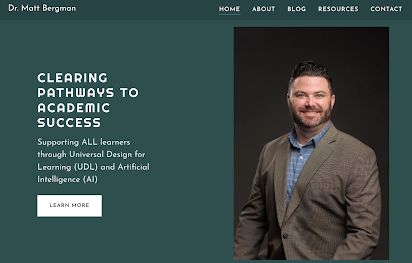 Sorry I haven't posted in a few weeks! It's been a really exciting time. My good friend Jon Mundorf (@fundorf) and I have been developing an online Universal Design for Learning course for Regional Training Center. Jon is an amazing fifth grade teacher from Florida. When you get the two of us together in the same room, the ideas just start flowing! Over the next few posts, I would like to share some basic Universal Design for Learning techniques that ALL teachers can use to create a positive learning environment for ALL students.
Sorry I haven't posted in a few weeks! It's been a really exciting time. My good friend Jon Mundorf (@fundorf) and I have been developing an online Universal Design for Learning course for Regional Training Center. Jon is an amazing fifth grade teacher from Florida. When you get the two of us together in the same room, the ideas just start flowing! Over the next few posts, I would like to share some basic Universal Design for Learning techniques that ALL teachers can use to create a positive learning environment for ALL students.
Jon was telling me about how he has to prepare his students for standardized testing. His school district has a mandatory time period where teachers are expected to quiz students each day. This can be draining for both teachers and students. Jon was telling me about some tools that he uses to prepare his students. I want to share a combination of Jon's ideas and mine in this post:
Whether you need to create a quiz in advance or on the fly, Socrative is a great way to have ALL students participate in answering questions. Jon has been piloting a BYOD program at his school and has used Socrative as a way to replace the traditional "clickers." Many schools are paying thousands of dollars for something they really don't need.
Socrative is a free alternative that students can access on any device! Jon gives a quiz in a short amount of time and is able to download reports of student progress. He uses these reports to drive instruction. Jon uses this tool to move beyond "what" the answer is and uses it instead to discuss "why" the answer is what it is.
Edmodo - An Engaging Way for Students to Work at Their Own Pace and Use Data-Driven Instruction
Social media is changing the way students, teachers, and parents communicate. Edmodo is an educational social network that is changing the way that we do school! Students can post responses in a typical Facebook-like discussion forum and upload assignments. I like the fact that students can take quizzes on Edmodo and get instant feedback. Edmodo may be more appropriate if you want your students to go at their own pace.
At the Milton Hershey School, I am evaluated on the percentage of students who pass national certification exams. I have used Edmodo as a study tool, where students take a quiz and get instant feedback. I have also used Edmodo as a traditional assessment tool, where they take the quiz and will have to wait to get feedback (so there is no cheating!). Edmodo's data analysis tools helped my students reach a 100% pass rate on several national exams!
4 Corner Trivia - Low-Tech Kinestic Activity with Amazing Results!
My PowerPoint slides have a series of multiple choice questions. I ask a question and have my students walk to the most appropriate answer. It's a great way see what students are thinking without having them say a word. Many of my "shy" students like this activity because there is very little social interaction involved.
Conclusion:
When assessing "what students know," it is important to provide a variety of ways to assess how learning is taking place. Kids hate the "drill and kill" methods we often employ. Rather than reviewing materials, we are doing more harm than good; therefore, using a combination of different review methods is important!
Although standardized testing is often limited to paper and pencil, having kids "show what they know" in different ways will solidify the concept in their brain and help them perform better on standardized tests.





No comments:
Post a Comment